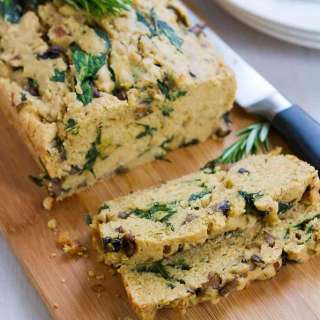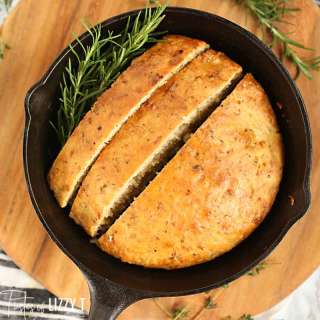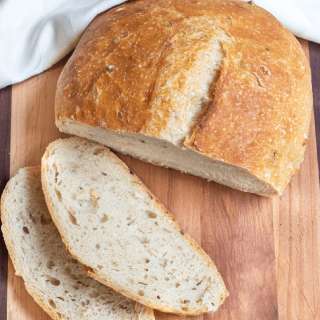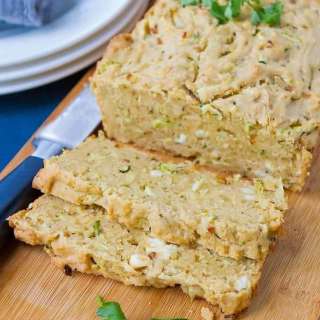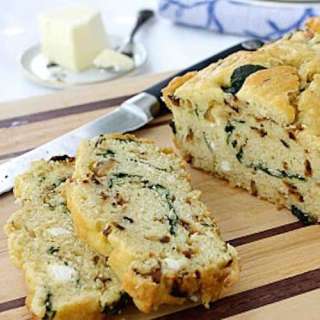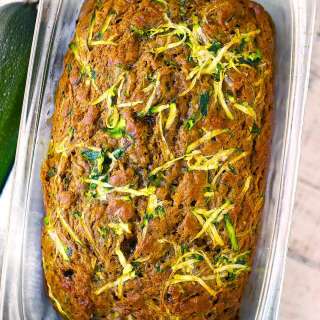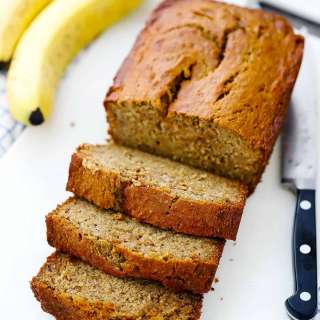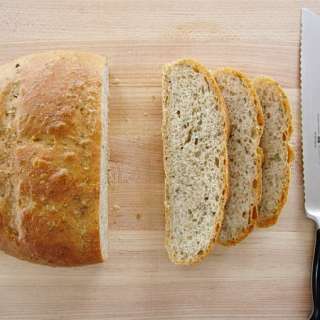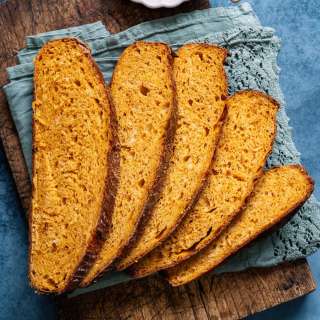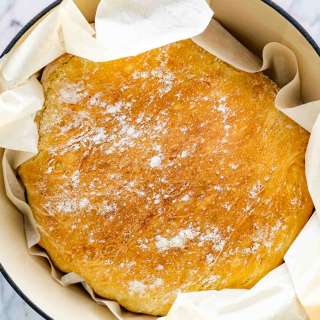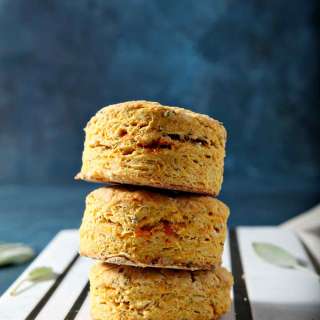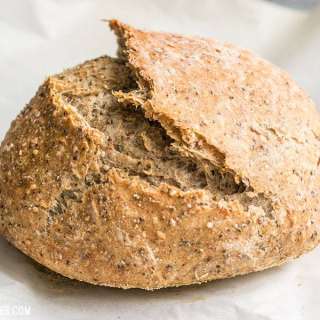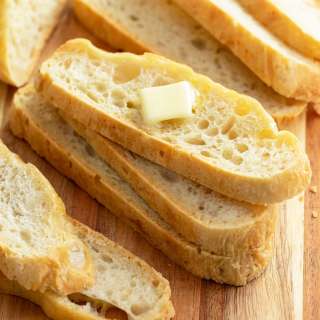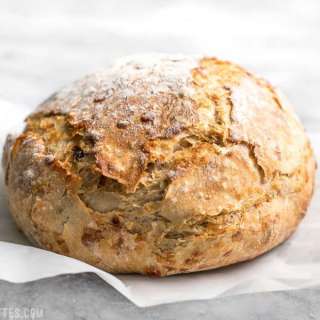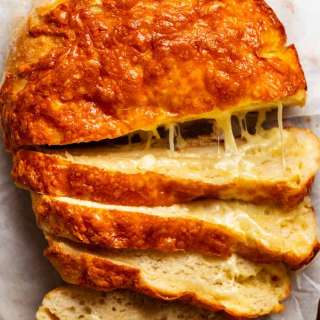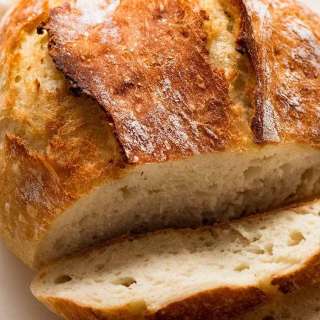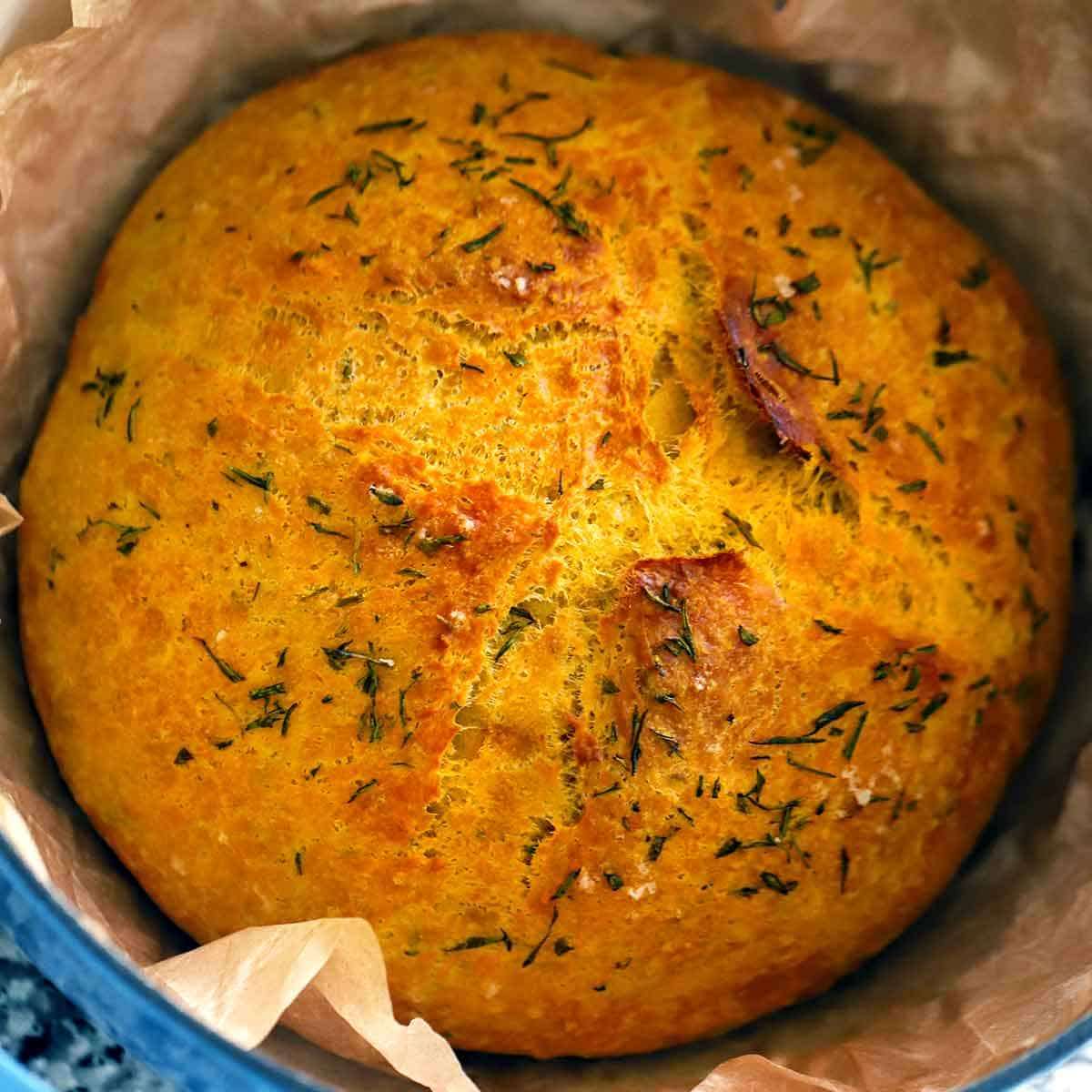
Pumpkin No Knead Bread with Rosemary and Olive Oil
User Reviews
3.0
3 reviews
Average

Pumpkin No Knead Bread with Rosemary and Olive Oil
Report
This Pumpkin No Knead Bread yields a crusty artisan loaf baked in a Dutch oven, with fresh rosemary, olive oil, and sea salt added. It's a delicious, savory way to enjoy pumpkin and yields a loaf of yeast bread that's a vibrant yellow-orange color, perfect for serving with those hearty autumn soups!
Share:
Ingredients
- 1 cup warm water heated to 110 degrees F, give or take 5 degrees, see notes
- 1 packet yeast active dry, instant, or quick rise - one packet equals 2 ¼ teaspoons, see notes
- ¾ cup canned pumpkin puree see notes
- 2 tablespoons roughly chopped fresh rosemary
- ½ tablespoon fine grain sea salt
- 2 tablespoons olive oil plus more as needed for greasing bowl and brushing top of loaf
- 3 ¼ cups all-purpose flour plus more if needed, see notes for other types of flour
- fresh rosemary leaves and flaky / coarse sea salt for topping, optional
Instructions
- In a large mixing bowl (or the bowl of a standing mixer), add the 1 cup warm water, 1 packet yeast, ¾ cup canned pumpkin puree, 2 tablespoons roughly chopped fresh rosemary, ½ tablespoon fine grain sea salt, and 2 tablespoons olive oil. Whisk or stir together until yeast and salt are fully dissolved.
- Add the 3 ¼ cups all-purpose flour. Mix together thoroughly, until very well combined. If you have a standing mixer, I recommend mixing for a few (around 3-5) minutes (this will allow the gluten to develop more).
- Cover the bowl (with a damp towel or plastic wrap) and allow to rise for approximately 2 hours, or until doubled in size (see notes for more on this).
- Preheat oven to 450 degrees F.
- Transfer the dough to a floured surface, being careful not to "smush" the dough too much to maintain the air pockets from rising, to shape into a loaf. This can be done a few ways - if you are unfamiliar with shaping no knead bread dough, I recommend using the tutorial from this traditional no knead loaf, which uses the parchment paper as an aid for easy shaping.
- Place the loaf on top of a piece of parchment paper, if it's not already. Add a little bit of olive oil to the top of the loaf using a brush or your hands, gently. You can optionally score the loaf at this point using a sharp knife in an "X" shape. Sprinkle some fresh rosemary leaves and flaky / coarse sea salt on top of the loaf.
- Using the edges of the parchment paper to help, transfer the loaf and the parchment paper to a Dutch oven (as an optional step, you can preheat the Dutch oven before this, see notes for more). Place the cover on the Dutch oven and bake for 35 minutes. Remove the cover and bake for another 5-10 minutes, until crust is a golden brown color.
- Transfer the loaf to a cooling rack. Ideally, allow the loaf to cool for at least an hour before slicing into it (this is the hardest part!). Cut into 8 slices (or however many you want) and serve.
Equipments used:
Notes
- It's important to heat the water precisely to about 110 degrees F. The warm water will help activate the yeast and enable the bread dough to rise. But if it's too hot, it could kill the yeast (which is a living organism) and the dough won't rise. I usually microwave the water for about 45 seconds on high, then use a meat thermometer to check. I love the Thermoworks Thermapen for checking temperatures, since it's incredibly fast and accurate! It's a worthy investment for your kitchen.
- The type of yeast you use will affect rise time. As the names suggest, rapid and instant yeast will take a shorter amount of time to rise.
- Keep on eye on the rise of the dough, regardless of the type of yeast used. Yeast thrives in a warm, humid environment. If your kitchen is cold and drafty, the dough may take longer to rise. If it's hot and humid, it will take a much shorter time. You don't want the dough to rise much past doubled, otherwise you run the risk of the dough over-proofing, which essentially means the yeast has run out of food to eat and begins to die off, making the dough deflate.
- To make the dough rise faster, place it in a warm, humid environment. My favorite way to do this is to microwave a mugful of water until it's steaming, then place the covered bowl of dough along with the steaming mug in the microwave and close the door. This will trap the heat and humidity in and cause the dough to rise much faster.
- Different flours can absorb water differently, depending on the type and amount of gluten in them. I use King Arthur All-Purpose Flour exclusively. Other brands and types may yield different results. Bread flour absorbs water more easily, so you'll need less of it (or more water) in the mix. Whole wheat four has much less gluten and is denser and heavier, as well as more absorbent, which can make it hard to work with. If you want to use whole wheat flour, I recommend subbing out no more than 1 cup of the all purpose flour for a mix of the two, especially if you're new to working with whole wheat. Almond flour or other non-grain flours should never be substituted for wheat flour in any recipe; they're completely different. Gluten free flour might work; while I haven't tested it myself, some readers have contacted me to let me know that it works, so feel free to experiment with that if you want!
- Pumpkin puree can sometimes be more watery depending on brand. This means the dough may need a little more flour. If it's not coming together - as in, it's more soupy than dough-ey - add a little more flour a couple tablespoons at a time when mixing together until it's the correct consistency.
- If you're new to no knead bread baking in a Dutch oven, I recommend reading through this recipe post for traditional no knead bread, which is a much more comprehensive guide.
- To store the leftovers, you can leave this bread out for about 24 hours. Beyond that, I recommend freezing it in an airtight bag. Do make sure you allow it to cool completely before freezing. For convenience, you can pre-slice it, so it's easy to grab a slice or two as needed from the freezer to defrost.
- Other ingredients you can add: feel free to add seeds, such as pepitas/pumpkin seeds, sunflower seeds, flax seeds, and/or chia seeds. Other herbs like oregano, thyme, or sage may be used in addition to or instead of rosemary. If you want a sweet pumpkin no knead bread, you may want to follow this recipe for cinnamon raisin no knead bread and substitute 3/4 cup of pumpkin puree for 1/2 cup of the water.
- Preheating your Dutch oven may help the loaf get a bit taller while it bakes. To do this, place your Dutch oven, covered, in the oven while it preheats, getting it nice and hot. Then place the parchment paper and loaf in the hot Dutch oven to bake as directed. If you do this, be VERY CAREFUL, as the Dutch oven will be very hot!! It's easy to forget that it's preheated. Be sure to wear oven mitts when handling it. I used to do this all the time, but lately I've been skipping this step to make it easier, still with great results.
Nutrition Information
Show Details
Calories
227kcal
(11%)
Carbohydrates
41g
(14%)
Protein
6g
(12%)
Fat
4g
(6%)
Saturated Fat
1g
(5%)
Polyunsaturated Fat
1g
Monounsaturated Fat
3g
Sodium
440mg
(18%)
Potassium
113mg
(3%)
Fiber
2g
(8%)
Sugar
1g
(2%)
Vitamin A
3589IU
(72%)
Vitamin C
1mg
(1%)
Calcium
17mg
(2%)
Iron
3mg
(17%)
Nutrition Facts
Serving: 8servings
Amount Per Serving
Calories 227 kcal
% Daily Value*
| Calories | 227kcal | 11% |
| Carbohydrates | 41g | 14% |
| Protein | 6g | 12% |
| Fat | 4g | 6% |
| Saturated Fat | 1g | 5% |
| Polyunsaturated Fat | 1g | 6% |
| Monounsaturated Fat | 3g | 15% |
| Sodium | 440mg | 18% |
| Potassium | 113mg | 2% |
| Fiber | 2g | 8% |
| Sugar | 1g | 2% |
| Vitamin A | 3589IU | 72% |
| Vitamin C | 1mg | 1% |
| Calcium | 17mg | 2% |
| Iron | 3mg | 17% |
* Percent Daily Values are based on a 2,000 calorie diet.
Genuine Reviews
User Reviews
Overall Rating
3.0
3 reviews
Average
Other Recipes
